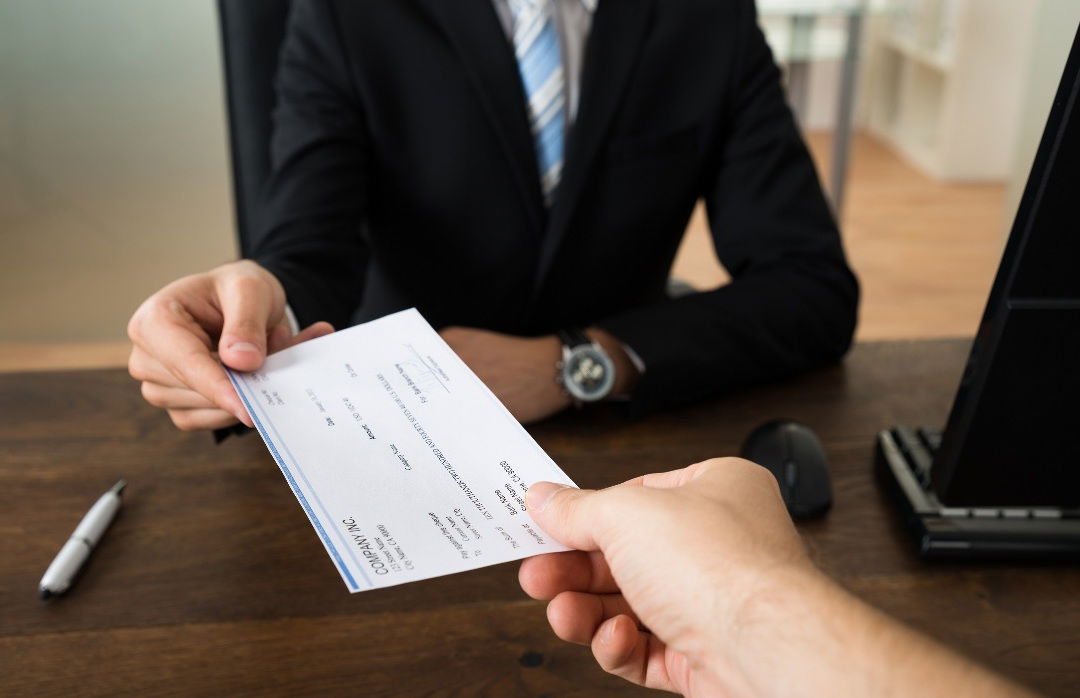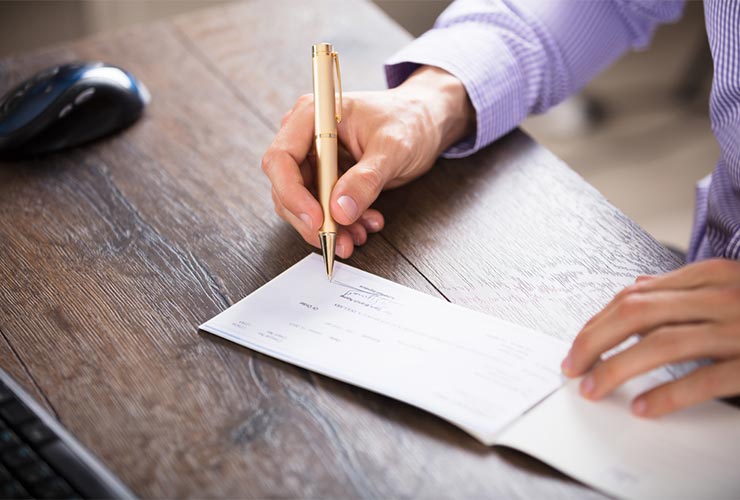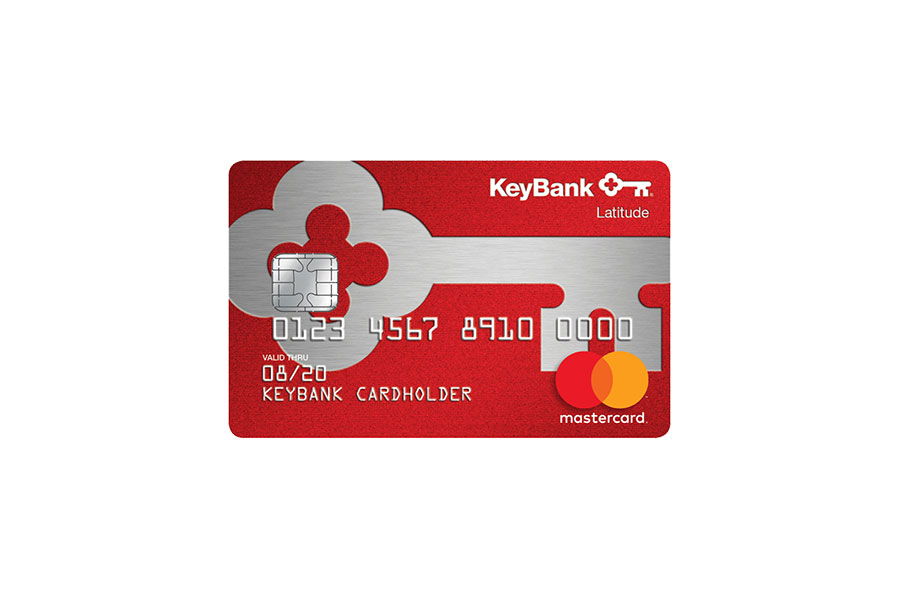When you’re making a large payment—like buying a car, putting down a deposit on a home, or paying a security deposit—a personal check might not be enough. Many sellers want guaranteed funds. That’s where a cashier’s check comes in.
A cashier’s check is issued by your bank and backed by its funds, not just yours. It’s one of the safest ways to send a high-dollar payment, especially when cash isn’t practical and a personal check could bounce.

In this guide, you’ll learn exactly what a cashier’s check is, when to use one, how to get it, what it costs, and what your other options are—so you can choose the best way to send money securely.
What a Cashier’s Check Is and How It Works
A cashier’s check is a secure way to send money when a personal check or cash won’t cut it. Instead of pulling the funds from your account after the check is cashed, your bank or credit union withdraws the money upfront and guarantees the payment.
Here’s how it works: once you request a cashier’s check, your bank takes the exact amount from your checking or savings account and issues a check made out to the recipient. The check is printed with the bank’s name and signed by a bank employee—not you. That gives the person receiving it confidence that the money is good and ready to go.
Because the funds are backed by the bank, not just your account, there’s no risk of the check bouncing. That makes cashier’s checks ideal for big purchases where trust and timing matter.
When to Use a Cashier’s Check Instead of Other Payments
Cashier’s checks are typically used for large transactions where the recipient needs guaranteed funds. Some of the most common situations include:
- Buying a car: Dealerships and private sellers often won’t accept personal checks.
- Real estate transactions: Lenders and sellers usually require certified funds for down payments or closing costs.
- Apartment security deposits: Some landlords ask for a cashier’s check to lock in a lease.
- Legal settlements or insurance payouts: These often require verified funds to avoid delays.
Cashier’s checks are also helpful in time-sensitive situations. Because they’re prepaid and backed by the bank, the funds usually clear within one business day—much faster than a personal check. If the person you’re paying needs access to the money quickly, this can make a big difference.
Where to Get a Cashier’s Check
You can get a cashier’s check at most banks or credit unions. Some financial institutions even let you request one online and either pick it up at a branch or have it mailed to your address.
If you already have a checking or savings account with the bank, the process is usually quick. Just keep in mind: not all banks issue cashier’s checks to non-customers. If you don’t have an account, you may need to pay in cash—and it might take more time to find a bank that’s willing to help.
Credit union members can also use shared branching networks. That means you may be able to get a cashier’s check at another credit union, even if it’s not your home branch.
See also: Where Can I Cash a Cashier’s Check?
How to Get a Cashier’s Check (Step-by-Step)
Getting a cashier’s check is simple if you come prepared. Here’s what you’ll need:
1. Know the exact amount – You can’t get a blank cashier’s check. You must provide the exact dollar amount at the time of request.
2. Bring the recipient’s name – The check must be made out to a specific person or business. You’ll also have the option to include a memo, such as an account number or reference.
3. Bring valid ID – Most banks require a government-issued photo ID to issue a cashier’s check.
4. Pay the amount plus any fee – If you have a bank account, the money will be withdrawn directly. If you’re a non-customer, you may need to bring cash.
Once the teller verifies your information, they’ll issue the check, sign it on behalf of the bank, and give you a receipt. Before leaving, double-check that all the details are correct—once you walk out, the check can’t be changed.
How much does a cashier’s check cost?
Most banks and credit unions charge between $5 and $15 for a cashier’s check. The exact fee depends on your financial institution and account type.
If you have a premium or high-tier checking account, you may be able to get cashier’s checks for free. It’s worth checking your account perks before you pay. Non-customers typically pay higher fees and must use cash to cover both the check amount and the fee.
How safe are cashier’s checks?
Cashier’s checks are considered one of the safest payment methods available. Since the funds are guaranteed by the bank and withdrawn upfront, there’s virtually no risk of the check bouncing.
In most cases, the recipient can access the funds within one business day. However, for especially large checks, banks may hold a portion—usually anything over $5,000—until the full check clears.
To protect yourself from fraud, make sure the check is issued by a legitimate financial institution and includes security features like watermarks, color-shifting ink, and microprint lines. If anything about the check looks unusual, verify it with the issuing bank before accepting or depositing it.
Cashier’s Check Scams to Watch Out For
Scammers often use fake cashier’s checks to trick people into sending money. A common version of this scam involves someone sending you a cashier’s check and asking you to send part of the money back—often as a “processing fee” or reimbursement.
Here are a few red flags:
- The check is for more than you expected
- The sender is a stranger or someone overseas
- You’re being asked to wire money or send gift cards in return
If you deposit a fraudulent check, your bank will reverse the funds and you’ll be on the hook for the full amount. Never accept a cashier’s check from someone you don’t trust, and always verify unexpected payments with the issuing bank.
Cheaper and Faster Alternatives to Cashier’s Checks
Depending on the situation, other payment methods might work just as well—or better.
Money Orders
Money orders are a good low-cost option if you don’t have a bank account. You can buy one with cash or a debit card at post offices, grocery stores, pharmacies, and convenience stores.
- Max limit: Usually $1,000
- Cost: Typically $1–$2
- When to use: For smaller transactions when you still want proof of payment
Money orders are not backed by a bank, so they aren’t as secure as cashier’s checks—but they’re widely accepted and easy to get.
Certified Checks
A certified check is written from your personal checking account, but stamped by the bank to verify that your signature is valid and that the funds are available.
- Bank involvement: Bank certifies but doesn’t guarantee funds
- Risk: If you spend the money before the recipient cashes the check, it could bounce
- When to use: Situations where a personal check is acceptable but extra assurance is helpful
Wire Transfers
Wire transfers are direct, electronic transfers from one bank to another.
- Speed: Same-day for domestic, several days for international
- Cost: $15–$35 per transfer
- When to use: Urgent, high-value transactions—especially if the recipient is overseas
Wire transfers are fast and reliable, but can be expensive and irreversible once sent.
Mobile Payment Apps
Apps like Zelle, Venmo, PayPal, Cash App, Apple Pay, and Google Pay offer free or low-fee ways to send money quickly.
- Best for: Everyday payments to people you know
- Limitations: Not accepted for real estate, car purchases, or other large guaranteed transactions
- Security: Generally safe, but not bank-guaranteed like cashier’s checks
See also: Cheapest Ways to Send Money Online
Final Thoughts
Cashier’s checks are one of the most secure ways to make large payments. They’re fast, trusted, and backed by your bank—which is why they’re often required in high-stakes transactions like buying a home or vehicle.
Just make sure you double-check the details before you leave the bank and avoid accepting one from anyone you don’t know. If you’re looking for speed, security, and peace of mind, a cashier’s check is often your best bet.
Frequently Asked Questions
Can I cancel a cashier’s check after it’s been issued?
You usually can’t cancel a cashier’s check once it’s been issued, especially if the recipient has already deposited it. If the check is lost or stolen, you may be able to request a stop payment, but the process is slow and may involve an indemnity bond and a waiting period of up to 90 days.
What happens if I lose a cashier’s check?
If you lose a cashier’s check, you’ll need to contact the bank that issued it and request a replacement. The bank may require a notarized statement and an indemnity bond before reissuing the check. This protects the bank in case the original check is cashed later.
Do cashier’s checks expire?
Cashier’s checks technically don’t expire, but some banks may refuse to honor them after 90 or 180 days. If you’re holding onto one, it’s best to cash or deposit it as soon as possible to avoid delays.
Can someone else pick up a cashier’s check for me?
Some banks allow a third party to pick up a cashier’s check on your behalf, but you’ll typically need to provide written authorization and a copy of your ID. Policies vary, so check with your bank first.
Do I have to pay taxes on money received by cashier’s check?
The form of payment doesn’t affect whether income is taxable. If the money you receive by cashier’s check counts as income—like payment for services—you’ll still need to report it to the IRS.




